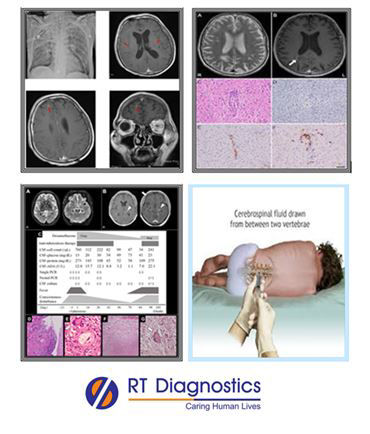ADENOSINE DEAMINASE (ADA) - CSF FLUID:
CLINICAL INFORMATION :
Adenosine deaminase (ADA) in CSF fluid is used as a diagnostic tool to differentiate tubercular meningitis (TBM) from aseptic meningitis. Test for CSF analysis is performed to help diagnose diseases or abnormal conditions that affect the brain (CNS) and spinal cord.
Adenosine Deaminase (ADA) levels in Cerebro-Spinal Fluid is a potential marker for the diagnosis of tuberculosis (TB) in meninges caused by Mycobacterium tuberculosis leading to an infection known as tuberculous meningitis (chronic prolonged condition is a fatal condition - if not detected treated in early stages). Adenosine deaminase also known as adenosine aminohydrolase or ADA is an enzyme involved in purine metabolism. This enzyme is needed for the breakdown of adenosine from the food and for the turn-over of nucleic acids in tissues. The most important primary function of this enzyme is in the development and maintenance of the immune system (deficiency of ADA causes pulmonary inflammation, thymic cell death, defective T-cell receptor signaling, and also severe combined immune deficiency - SCID) and its other functions include epithelial cell differentiation, neurotransmission, gestation maintenance and stimulates the release of excitatory amino acids. ADA is also increased in many diseases particularly those associated with the immune system for example rheumatoid arthritis, psoriasis, and sarcoidosis. Low levels of ADA lead to pulmonary fibrosis whereas chronic exposure to high levels of ADA leads to exacerbating inflammation instead of suppressing them. The estimation of enzyme adenosine deaminase is performed as a marker for the diagnosis of TB since this enzyme level is increased due to the stimulation of T-cell lymphocytes by mycobacterial antigens. In children symptoms of ADA deficiency are pneumonia, chronic diarrhea, widespread rashes, developmental delay, and also with severe combined immunodeficiency (SCID) characterized by disturbed development of functional T-cell and B-cell. Other tests include enzymatic assays or colorimetric, HPLC, spectrophotometry, etc.

General instructions:
Sample Requirement: CSF specimen by lumbar puncture. Test Preparation: none.
NOTE - Sample for specimen collections may vary based on the patient’s condition/cases according to the patient’s presentingcomplaints / signs or symptoms:
SPECIMEN REQUIREMENT (Special or Rare Cases) - As instructed and guided by Physician / Clinician / Pathologist / as per Laboratory’s requirements, according to procedures and protocols.
This Multi-Specialty Clinical Referral Laboratory “RTDIAGNOSTICS” provides precise and accurate tests with an extensive range of testing services to the medical centers to help in the diagnosis and identification of pathology in the test specimens for infectious diseases and also to evaluate the function of organ systems of the patient. It prevents further complications and helps to stabilize and restore health to near normalcy at the earliest without delay.



